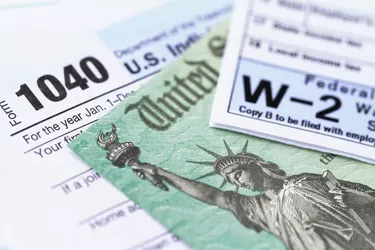
If you make money with a cryptocurrency, such as Bitcoin or Ethereum, the Internal Revenue Service wants their share for taxes.
Even though one of the attractions of a cryptocurrency is its anonymity, the IRS and the FBI are stepping up their efforts to identify anyone who is using cryptocurrency to enforce the collection of taxes on cryptocurrency transactions. The IRS is working with crypto exchanges, such as Coinbase, and with companies that analyze cryptocurrency blockchains to create 1099 reports that can be checked against individual tax returns.
Video of the Day
Video of the Day
Starting in 2021, IRS Form 1040 tax return requires taxpayers to answer the question, "Did you receive, sell, exchange or otherwise dispose of any financial interest in any virtual currency?" Failure to answer this question could subject taxpayers to penalties and possible criminal prosecution for tax evasion.
There are a number of ways you can owe taxes with cryptocurrency transactions.
Are There Taxes on Cryptocurrency Trades?
The IRS considers crypto a kind of capital asset, such as real-estate and stock, but not a currency. As such, if you make a profit trading crypto assets, you will owe taxes to the IRS. You can calculate your capital gains and losses by subtracting the cost basis of the cryptocurrency from its fair market value at time of sale.
Simply buying and holding a cryptocurrency is not a taxable event. Even if it's value goes up, you won't owe any money for tax purposes until you sell a crypto or create another type of taxable event.
You'll trigger a taxable event when you "realize" a gain or receive income. Examples of crypto transactions include:
- Using cryptocurrency to pay for goods or services. Suppose you purchase a Bitcoin for $30,000. Its value goes up, and you trade it for a car worth $50,000. You'll owe taxes on a capital gain of $20,000.
- Trading different types of cryptocurrency. Say you purchased $20,000 of Ethereum. Its value rises to $25,000, and you trade it for $30,000 in Bitcoin. You'll have to pay taxes on your gain of $5,000.
- Selling cryptocurrency for a fiat currency. Pretend you used U.S. dollars to purchase Ethereum worth $3,700, and its price went down to $3,000. If you sell your Ethereum and recover your U.S. dollars, you would incur a capital loss of $700.
Consider also: Is Bitcoin Still a Player?
Are There Taxes on Crypto Earnings?
In addition to paying taxes on gains and losses for buying and selling cryptocurrencies, you could also be liable for income taxes on the U.S. dollar value of crypto earnings. Here are a few examples of the types of crypto taxable income:
- mining crypto
- staking crypto
- receiving crypto from an employer or client as payments for a service
- earning interest on crypto loans
Consider also: Venmo & Cryptocurrency
What Are the Cryptocurrency Tax Rates?
Gains and losses on cryptocurrency transactions are taxed the same way as stocks. To calculate your gain or loss, you'll start with the date you purchase a cryptocurrency, the date sold or exchanged and the cost basis, including transaction fees. Then you'll pay taxes at either the short- or long-term rate, depending on how long you've owned the crypto.
- Short-term capital gains: If you've held the crypto for one year or less, gains and losses would be taxed at your ordinary income tax rate.
- Long-term capital gains: If you've held the crypto for more than one year, you'll pay a capital gains tax at either 0 percent, 15 percent or 20 percent, depending on the tax bracket for your level of income and filing status, whether single, married filing jointly or head of household.
How to Report Taxes on Crypto
You'll use IRS tax Form 8949 to calculate your tax liability from crypto gains and losses and report these figures on Schedule D of federal income tax Form 1040. However, since many of the tax rules for virtual currency transactions are still being worked out, it would be a good idea to consult a tax professional if there are any tax implications from your cryptocurrency transactions.
- CBS News: Yes, Taxpayers Must Report Their Cryptocurrency Trading to the IRS
- Forbes: Cryptocurrency Taxes 2022: What You Need To Know
- IntuitTurboTax: Your Cryptocurrency Tax Guide
- IRS.gov: Tax Treatment of Transactions in Cryptocurrency and IRS Tax Enforcement
- IRS.gov: Tax Principles for Virtual Currency
- IRS: Frequently Asked Questions on Virtual Currency Transactions
- IRS.gov: Form 1040
- IRS.gov: Form 8949